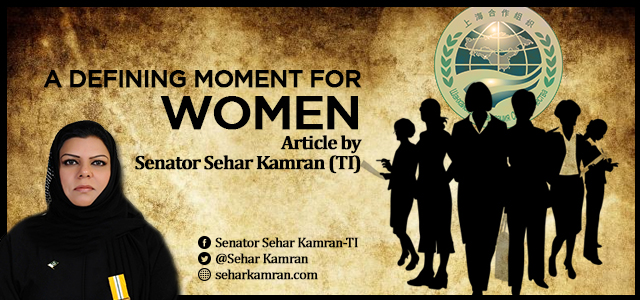By Senator Sehar Kamran (TI)
August 06, 2017
 “No nation can rise to the height of glory unless your women are side by side with you”
“No nation can rise to the height of glory unless your women are side by side with you”
–Muhammad Ali Jinnah
The Shanghai Cooperation Organisation (SCO) is an extraordinary and unique regional organisation.Its recent expansion is undoubtedly a historic moment, and a representation of the changing geopolitical realities of the world at large, but more specifically of the changing geopolitical and geostrategic environment of this region. Today, it is the only bloc that is host to four regional nuclear-weapon states, with both development and security-related concerns on its agenda.
Entry into the organisation was an auspicious moment for Pakistan, and the fruit of a labor of efforts spanning a decade. Amongst the many positives that Pakistan brings to this table, the foremost is connectivity; it lies at the tri‐junction of South, West, and Central Asia, and will act as the ‘zipper’, bringing the region together both physically and economically.
It will also strengthen trade links and improve relations with border countries, opening doors of new partnerships in fields as varied as agriculture, science, education, and energy corridors as well as increase people-to-people contact and interactions. Significantly, the first major event following the expansion was the ‘First International Women’s Congress of the Shanghai Cooperation Organization & BRICS Member States’, held in Novosibirsk, Russia last month. Its purpose was to encourage members of the Congress and women-leaders to brainstorm new concepts for cooperation in the political, economic, scientific, educational and cultural spheres, to help create new opportunities and spheres for the realization of women’s potential.
I had the distinct honor of being invited to represent my country at this historic event, to speak about “Regionalism and our Common Destiny”, in the context of the very vital role of women in promoting peace, prosperity and stability. The event was a landmark in furthering gender equality in the region, and strengthening the international movement in support of women’s role and rights, in line with the values supported by the 23rd Special Session of the United Nations General Assembly.
Across the SCO, women comprise about 50. 75% of the population; about 22% of the entire global population! In Pakistan, this percentage is about 50%. This is no small force to ignore. The Conference was a step towards mobilising the hitherto dormant force of this vast segment of the population, and recognition that gender equality is central to any sustainable progress. Equality of opportunity is not an option or a choice any more, but a belief in, and a commitment to the betterment of future generations.
Today, women are crossing every frontier and overcoming these challenges to stand alongside their male counterparts, and achieving new heights of success. They are excelling in every walk of life. They have made their mark as scientists, soldiers, bankers and fighter pilots, as artists, writers, activists, entrepreneurs, scientists and even as Army Generals. They have highest echelons of power. They have climbed the highest mountain peaks, and even reached space.
Pakistan has also produced generations of such great women. The mother of the nation, the honorable Fatima Jinnah, not only stood alongside her brother, but also successfully led the independence campaign in her own right.
Pakistan even elected its first female Prime Minister, the Honorable Martyred Mohtarma Benazir Bhutto, who I also have the great privilege of calling my leader and mentor, as early as 1988, well ahead of many developed nations in the world. She had to fight against one of the most brutal dictators in the country’s history, by leading a great campaign in which she was joined by millions calling for the restoration of democracy at a time when criticism against the sitting regime was met with public flogging. But she galvanised her followers’ hearts and souls, challenged extremism and terrorism by promoting strategies for peace, and emerged victorious. Such is the power of change that strong women can influence.
We must now do our bit to support and encourage more women from our region to be empowered. Increasingly, women MPs are emerging as catalysts for cross party dialogue on imperative social issues and above all to promote peace, tolerance and rule of law, but a look at the SCO regional countries highlights that women occupy a mere 27.
- 1 percent seats in the lower house of parliament in Kazakhstan, 24.
- 2% in China, 20.
- 6% in Pakistan, 19.
- 2% in Kyrgyzstan, 19% in Tajikistan, 16% in Uzbekistan, 15.
- 8% in Russian Federation, and 11.
- 8% in India (according to the data provided by Inter-Parliamentary Union).
Similarly, as late as 2011, women comprised fewer than 4% of signatories to peace agreements and less than 10% of negotiators at peace tables.
As the region’s security situation requires immediate attention, efforts can be made to include more women in the negotiating and decision-making processes. Better representation in decision-making processes, especially in institutions like Parliamentary Assemblies and other such legislative bodies is important because National Parliaments are vital symbols of, and provide critical forums for, leadership and safeguarding of the rule of law and human rights.
The legislative and oversight roles provide women parliamentarians with an important platform to influence social change and contribute to peace, security and development. Post-conflict engagement also provides an opportunity for women to ensure that peace agreements, new laws and new constitutions do not reinforce the pre-existing status quo, but advance equality and justice.
The Congress was a milestone in this context. To recognize the potential of and the need for gender equality, the SCO and BRICS member states took the first step towards truly sustainable progress and true prosperity of our region and our people. To push for an improvement in this sector, I also availed the opportunity provided by the platform of the Congress to suggest putting together a similar forum titled “Women for Peace”, with members from amongst the most eminent women of this region who have played a significant role in promoting peace and prosperity in the region, and could tackle differences from a different and perhaps a more effective perspective.
We must now devote even greater attention to the strengthening and rebirth of our societies, rather than focusing on the geopolitical and geostrategic interests of extra-regional powers. And there is no better platform to do that, than the SCO. It offers alternate mechanisms for cooperation and has the potential to bring this resource-rich area together like never before. It could be the solution to the hitherto thwarted rise of Asia as the formidable, unified entity it has the capacity to become. With the expansion of the organization, it is stronger today than ever before, and can potentially stand as a vanguard against extra-regional disruptive designs, and women can play an important role is making that happen.
As the Conference indicated, we must take the first collective step towards diminishing the distances and misunderstandings between us, and work towards the betterment and prosperity of entire region.
We must realise that our women can be amongst our greatest strengths. This article contains excerpts from Senator Sehar Kamran’s speech at the first International Women’s Conference of the Shanghai Cooperation Organization and BRICS member States, held from 2-4th July, 2017, where she had the distinct privilege of representing Pakistan.
Same version of the article appeared in The Nation


